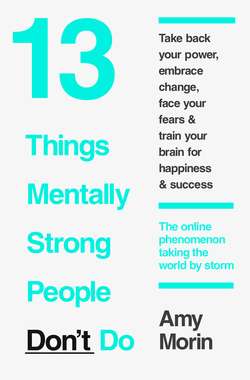Читать книгу 13 Things Mentally Strong People Don’t Do - Amy Morin, Amy Morin - Страница 16
Giving Up Self-Pity will Make you Stronger
ОглавлениеJeremiah Denton served as a U.S. naval aviator during the Vietnam War. In 1965, his plane was shot down and he was forced to eject from his aircraft. He was captured by the North Vietnamese and was taken as a prisoner of war.
Commander Denton and the other officers maintained command over their fellow prisoners even as they were beaten, starved, and tortured on a daily basis. Commander Denton was often placed in solitary confinement for urging other prisoners to resist the North Vietnamese attempts to gain information from them. But that didn’t stop Commander Denton. He devised strategies to communicate with the other prisoners by using signs, tapping on walls, and coughing in sequence.
Ten months after his capture, he was chosen to participate in a televised interview that was used as propaganda. While answering questions, he pretended as though the bright lights from the cameras were bothering his eyes as he began blinking T-O-R-T-U-R-E in Morse code to secretly send the message that he and his fellow prisoners were being mistreated by their captors. Throughout the interview, he continued to express his support for the U.S. government.
He was released in 1973 after seven years in captivity. When he stepped off the plane as a free man, he said, “We are honored to have had the opportunity to serve our country under difficult circumstances. We are profoundly grateful to our commander in chief and to our nation for this day. God bless America.” After retiring from the military in 1977, he was elected to serve as senator for Alabama.
Despite being placed in the worst circumstances imaginable, Jeremiah Denton didn’t waste time feeling sorry for himself. Instead, he maintained his composure and focused on doing whatever he could to manage the situation. Even when he was released, he chose to feel grateful that he was able to serve his country, rather than pity himself for the time he’d lost.
Researchers studied the differences that occur when people focus on their burdens versus focusing on what they’re grateful for. Simply acknowledging a few things you feel grateful for each day is a powerful way to create change. In fact, gratitude not only impacts your psychological health, it can also affect your physical health. A 2003 study published in the Journal of Personality and Social Psychology found:
• People who feel gratitude don’t get sick as often as others. They have better immune systems and report fewer aches and pains. They have lower blood pressure and they exercise more often than the general population. They take better care of their health, sleep longer, and even report feeling more refreshed upon waking.
• Gratitude leads to more positive emotions. People who feel grateful experience more happiness, joy, and pleasure on a daily basis. They even feel more awake and energetic.
• Gratitude improves social lives. Grateful people are more willing to forgive others. They behave in a more outgoing fashion and feel less lonely and isolated. They are also more likely to help other people and to behave in a generous and compassionate manner.
